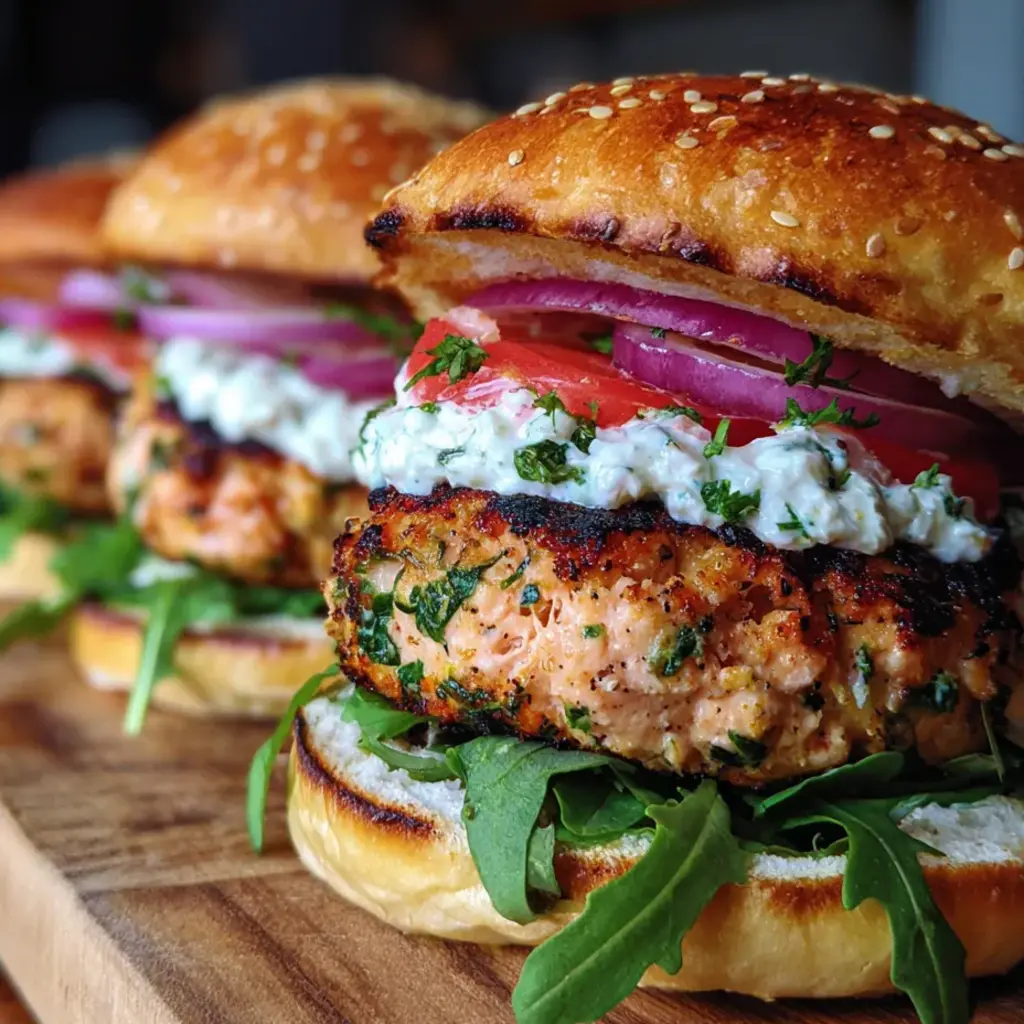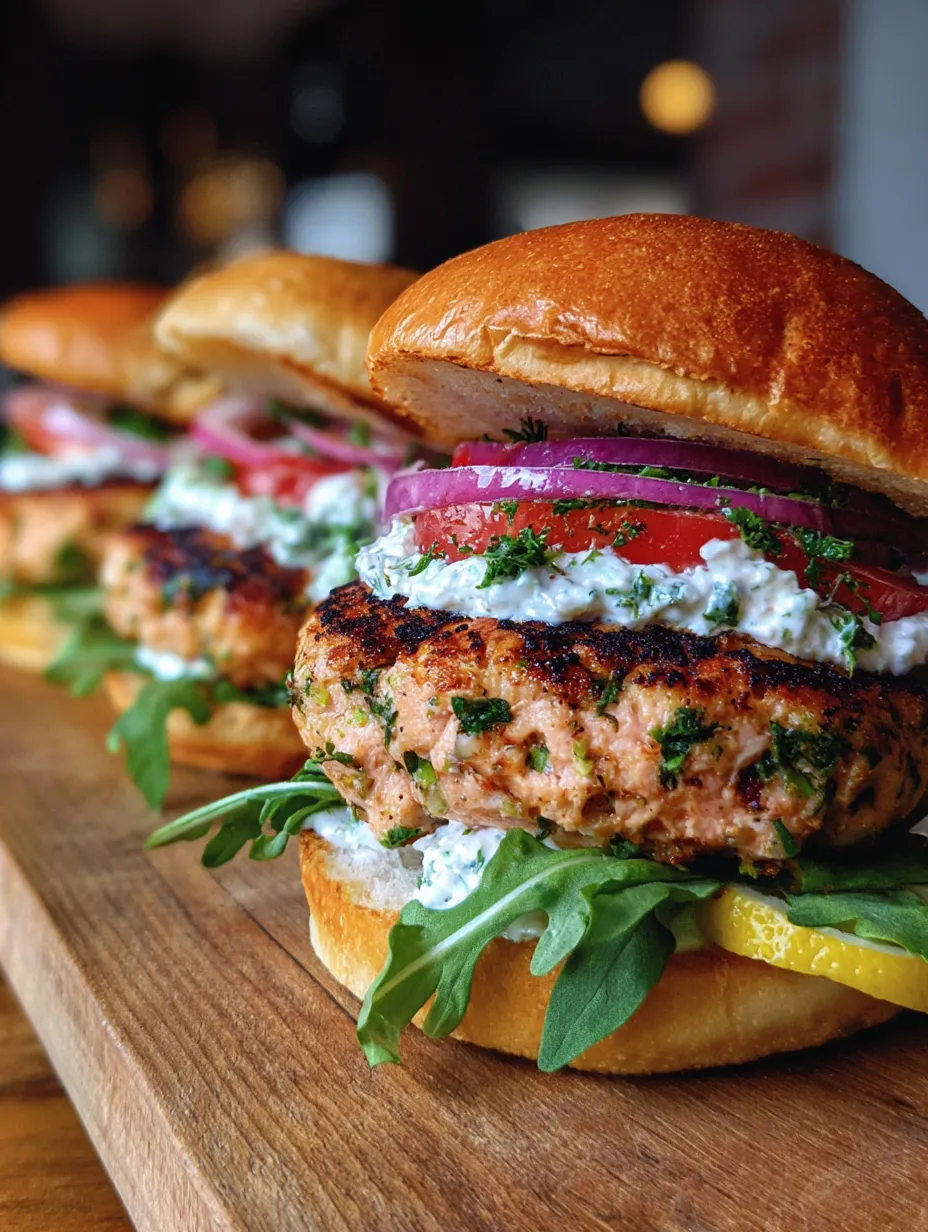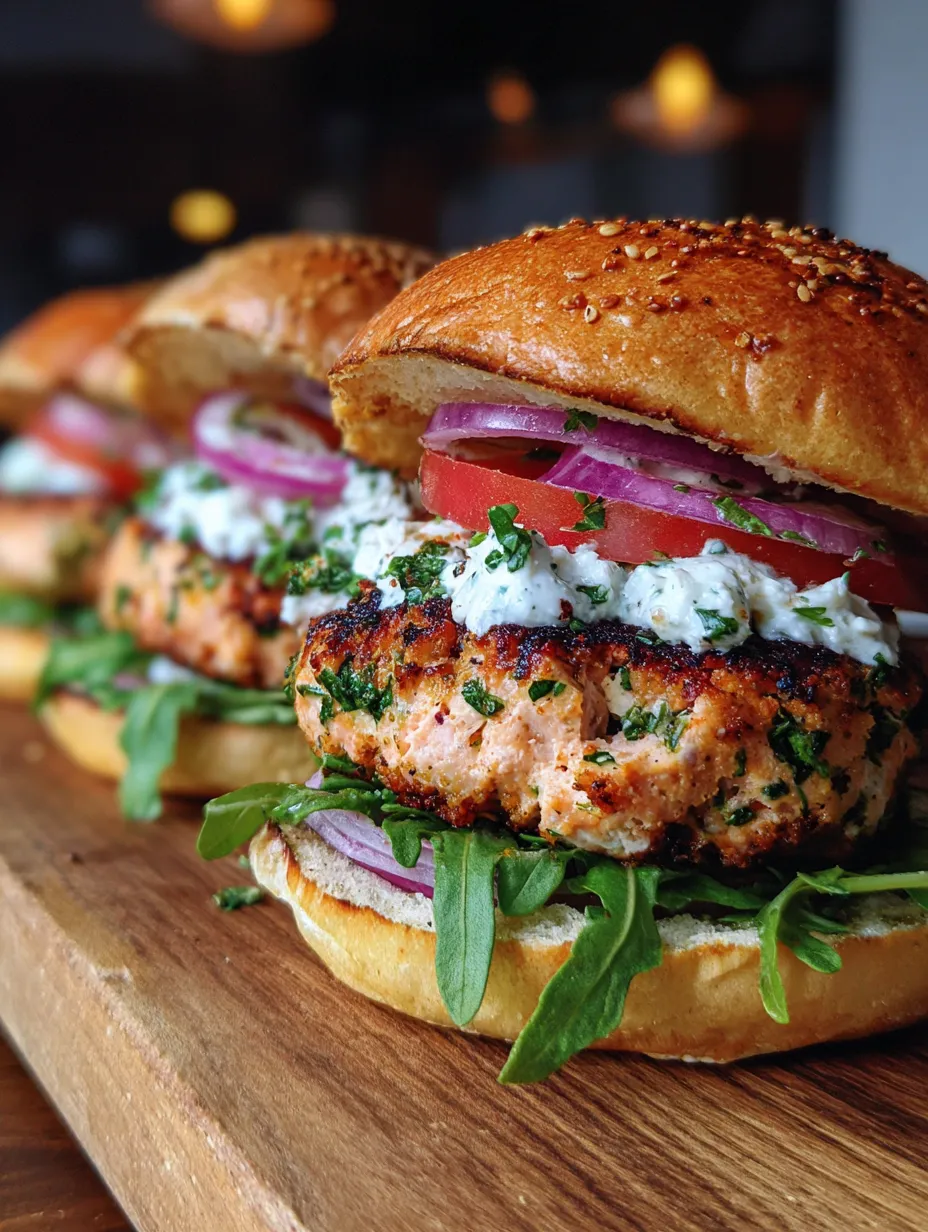 Pin it
Pin it
This salmon burger recipe brings a fresh twist to a classic favorite with bright herbs and warm spices creating a juicy, flavorful patty. It’s perfect for a light dinner or a weekend cookout when you want something hearty yet not too heavy.
I first tried these salmon burgers on a sunny afternoon and was amazed at how the sumac gave a lively citrus note that paired beautifully with the herb mix. Now they’re a regular request when I want something easy but impressive.
Ingredients
- Skinless salmon fillet: cut into bite-sized pieces for tenderness and easy processing
- Dijon mustard: helps bind and adds subtle tang enhancing the salmon
- Minced green onions: provide a mild onion flavor without overpowering
- Chopped parsley leaves and tender stems: bring fresh herbal brightness
- Ground coriander: adds warm earthiness complementing the fish
- Ground sumac: lends a lemony hint which lifts the whole flavor
- Sweet paprika: offers gentle smokiness and depth
- Black pepper: seasons with a touch of heat
- Kosher salt: to balance and bring out all flavors
- Unseasoned bread crumbs or gluten-free variant: create a light crust for crispness
- Extra virgin olive oil for cooking: adds fruitiness and helps get a perfect sear
- Fresh lemon for finishing: adds brightness and freshness
- Tzatziki sauce: for creamy coolness and contrast
- Baby arugula: for peppery crunch
- Tomato and red onion slices: for juicy and sharp notes
- Toasted buns like ciabatta or whole wheat: hold everything together and add texture
Step-by-Step Instructions
- Process the Salmon:
- Add about one quarter of the salmon and Dijon mustard to a large food processor bowl. Pulse until it forms a smooth paste, which provides a binding base for the burgers. Transfer this paste to a mixing bowl. Add the remaining salmon in smaller amounts and pulse just a couple of times. Keep some texture in this batch so the burgers don’t become mushy.
- Flavor the Salmon:
- To the bowl with the salmon paste and chunks, add minced green onions, chopped parsley, ground coriander, sumac, sweet paprika, black pepper, and a generous pinch of kosher salt. Mix thoroughly to combine all the ingredients evenly. Cover the bowl and chill in the fridge for about 30 minutes to let the flavors meld.
- Make the Salmon Patties:
- Prepare a sheet pan lined with parchment paper and spread bread crumbs on a plate. Divide the chilled salmon mixture into four equal portions. Shape each portion gently into a 1-inch thick patty. Press each patty into the bread crumbs, coating both sides evenly. Place the breaded patties on the parchment-lined sheet pan to keep them ready for cooking.
- Cook Salmon Patties:
- Heat extra virgin olive oil over medium-high heat until shimmering but not smoking. Carefully place the salmon patties into the hot oil. Cook for 2 to 4 minutes per side, flipping once, until they are lightly browned and reach medium-rare doneness around 115 to 120 degrees Fahrenheit. Adjust the heat as needed to maintain a steady sizzle without burning the crust.
- Finish and Drain:
- Remove the cooked salmon patties and place them on paper towels to drain any excess oil. Lightly sprinkle with kosher salt and squeeze fresh lemon juice over each patty to brighten the flavors just before serving.
- Assemble the Salmon Burgers:
- Toast your chosen buns and spread each with a thin layer of tzatziki sauce. Add a salmon patty to each bun, then layer on baby arugula, tomato slices, and thinly sliced red onion. Serve immediately and enjoy the mix of warm, crisp, cool, and fresh bites.
 Pin it
Pin it
My favorite ingredient here is sumac because it transforms this burger from ordinary to memorable with its bright zing. I remember serving these at a family gathering where even the picky eaters went back for seconds, surprised by the freshness and complexity.
Storage tips
Cooked salmon burgers keep well in the fridge for up to two days stored in an airtight container. You can reheat them gently in a skillet or microwave but avoid overcooking to maintain moisture. The uncooked patties freeze well if wrapped tightly with parchment and then foil, allowing you to enjoy fresh salmon burgers anytime.
Ingredient substitutions
If fresh salmon isn’t available, wild-caught frozen salmon thawed properly works great. You could substitute green onions with finely chopped shallots or chives for a similar mild onion flavor. If sumac is hard to find, a small squeeze of fresh lemon juice added at mixing can replicate some acidity but sumac’s unique flavor is worth sourcing.
Serving suggestions
Serve these burgers with crispy sweet potato fries or a bright quinoa salad tossed with lemon and herbs. A side of grilled vegetables or a fresh cucumber salad complements the refreshing tzatziki perfectly. These burgers also make for a delicious picnic treat when packed with toppings separated until ready to assemble.
Cultural context
Salmon burgers have gained popularity in coastal regions where fresh salmon is abundant. The use of sumac points to Middle Eastern influences, adding lemony tang typical in their spice blends. Tzatziki reflects Greek culinary tradition, lending creamy cooling balance. Together this recipe showcases a wonderful fusion of vibrant flavors.
 Pin it
Pin it
Frequently Asked Questions
- → How do you keep salmon patties from falling apart?
Using unseasoned breadcrumbs and chilling the mixture before shaping helps the patties hold together well during cooking.
- → What’s the best way to cook salmon patties for optimal texture?
Pan-frying over medium-high heat with olive oil until golden brown and medium-rare inside ensures moist, flavorful patties.
- → Which spices enhance the salmon flavor here?
Ground coriander, sumac, paprika, and black pepper provide a layered, slightly tangy and smoky depth.
- → Can I use skin-on salmon fillets?
It’s best to slice off the skin before chopping to achieve a uniform texture and avoid toughness.
- → How is the topping combination balanced?
Tzatziki adds creaminess and cooling notes while arugula, tomato, and red onion contribute freshness and crunch.
- → What’s a good thermometer target for cooking salmon patties?
Cooking to an internal temperature of around 115 to 120°F keeps the salmon medium-rare and juicy.
